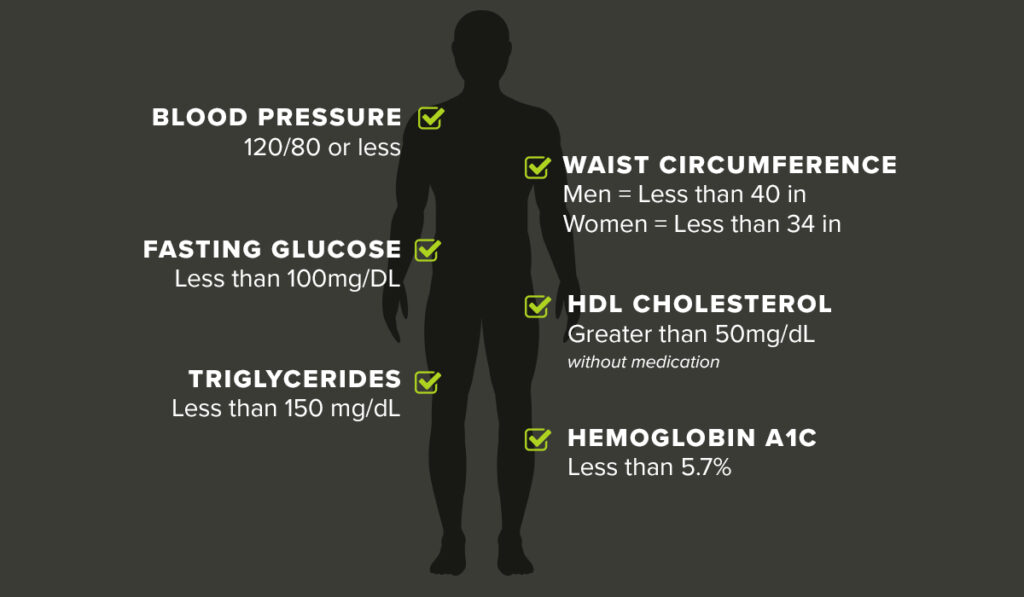The leading cause of death for all genders in the United States is heart disease. That’s a grim fact. But it illustrates the importance of having a healthy ticker. Plus, having a heart that’s functioning its best helps keep your overall health in tip-top shape.
Here, we’ll look at what it means to have a healthy heart and how to boost cardiovascular health with lifestyle changes, including your nutrition.

What Is A Healthy Heart? Why Does It Matter?
One way to gauge heart health is to find out if you’re metabolically healthy. Metabolic health is determined as having healthy metrics of five factors without the use of medications to control those factors.

5 Factors of Metabolic Health
Waist Circumference: <40 inches for men and <34 inches for women
Fasting Glucose & Hemoglobin A1c: <100 mg/dL for glucose and <5.7% for A1c
Blood Pressure: systolic <120 and diastolic <80 mmHg
Triglycerides: <150 mg/dL
High-Density Lipoprotein (“GOOD”) Cholesterol: ≥40 mg/dL for men and ≥50 mg/dL for women
Only 12% of people in the United States are considered metabolically healthy based on these parameters. If three or more of these factors are not within healthy ranges, then a person has metabolic syndrome. Metabolic syndrome puts you at risk for heart disease, stroke, heart attack, and several chronic conditions.
Another factor that can indicate a healthy heart is your heart rate at rest. For most adults, a healthy resting heart rate is 55 to 85 beats per minute.
Some heart conditions are out of our control, such as congenital heart defects and some types of arrythmias. But many heart conditions can be prevented with lifestyle changes.

What Lifestyle Habits Help Heart Health?
These lifestyle habits have beneficial effects on the five factors of metabolic health and therefore help your heart.
1. Get Quality (And Enough) Sleep – Sleep helps with blood sugar control, stress relief, hormonal regulation, and more.
Aim for at least seven hours per night, while minimizing interruptions for better heart health.
2. Reduce Stress – Chronic stress raises our risk for cardiovascular disease. You can reduce stress by doing activities that help switch off your “fight-or-flight” response and tap into the “rest-and-digest” arm of your autonomic nervous system.
Try meditation, yoga, breath work, your favorite relaxing hobby, exercise, and more.
3. Get Zone 2 Cardio Exercise – All types of physical activity are beneficial for heart health, but zone 2 cardio is especially good for you. Zone 2 exercise strengthens your ticker muscles, increases oxygen capacity, improves cardiorespiratory fitness, and increases mitochondria. Mitochondria are the powerhouses of our cells.
Zone 2 is when you’re exercising at 60 to 70% of your maximum heart rate. The intensity should be easy enough to maintain for 20 minutes or longer, but hard enough that you still feel like you are working. Hiking, fast walking, easy running, swimming, cycling, rowing, and more are all great activities for getting and staying in zone 2. If you have a smartwatch, it may calculate your zone 2 range for you.
To keep it simple, use the talk test. Can you maintain the intensity while having a conversation without getting breathless?
Aim for at least 150 minutes of zone 2 per week for a minimum 20 minutes per session at first, but go longer as you gain fitness.
4. Strength Train – Resistance training, such as with weights or doing bodyweight exercises, also helps the heart. Building muscle increases your metabolic rate, or the calories you burn at rest, which can then spur weight loss. More muscle mass also helps with regulating blood sugar and cholesterol, which can aid heart health. Plus, resistance training can lower the risk of serious cardiac events.
Aim for at least two to three strength-training sessions per week.
5. Don’t Smoke – Smoking and vaping tobacco is by far the worst thing you can do for your heart. If you currently smoke, talk to your doctor about a smoking cessation plan that’s right for you.

What Nutritional Habits Are Good For The Heart
Nutrition is a crucial factor when it comes to cardiovascular health. Here are some basics that will help protect and support one of your most essential organs.
- Keep Blood Sugar Stable – Minimizing spikes in blood sugar can help the heart by preventing or reversing insulin resistance. Insulin resistance can lead to a higher fasting glucose level and prediabetes or Type 2 diabetes. To keep blood sugar stable, reduce reliance on refined carbohydrates and always pair carbs with protein, fiber, or healthy fats. These nutrients help slow absorption of glucose into the bloodstream.
- Eat An Adequate Amount Of Protein – Protein is necessary for building muscle and preventing muscle loss. Plus, increased protein consumption helps reduce risk for high blood pressure and coronary artery disease. Your protein needs will vary depending on your body weight and activity level. Aim for 0.5 to 1 gram of protein per pound of body weight per day, going for the higher end of the range if you’re active.
- Focus On Nutrient-Dense Foods – Nutrient-dense foods are real-food ingredients, such as fruits, veggies, lean meat, fish, healthy fats, quality whole grains, nuts, legumes, and dairy. These help ensure that you’re getting a good dose of vitamins and minerals, while reducing intake of ultra-processed items.
- Avoid Ultra-Processed Foods – Ultra-processed foods are typically low on nutrients and loaded with added sugar, refined carbohydrates, chemical additives, and more, all of which are known to drive inflammation and harm heart health.
- Avoid Processed Vegetable & Seed Oils – Processed vegetable and seed oils include canola, cottonseed, soybean, safflower, and more. These oils are highly processed and contain high levels of omega-6 fatty acids. While our bodies need some omega 6 fats, too much, as is common in many diets in the U.S., drives inflammation and disease processes. Stick to olive and avocado oil.
- Keep Key Electrolytes Balanced – Key electrolytes include potassium, magnesium, calcium, and sodium. A proper balance is crucial for heart health. A focus on eating nutrient-dense whole foods, while minimizing consumption of ultra-processed foods, will help you keep your electrolytes balanced. Stay hydrated, as well, and replenish lost fluids after physical activity. If you’re concerned about your electrolyte balance, talk to your doctor for testing and any recommendations unique to you.

To Recap
For lifestyle habits, getting quality (and enough) sleep, reducing stress, getting zone 2 cardio exercise, strength training and not smoking have beneficial effects on your metabolic health and therefore help your heart. For nutrition habits, keep blood sugar stable, eat an adequate amount of protein, focus on nutrient-dense foods, keep key electrolytes balanced, and avoid ultra-processed foods, and vegetable and seed oils to help protect and support one of your most essential organs.
About The Author: Jennifer Chesak, MSJ
Jennifer Chesak is an award-winning author, science and medical journalist, editor, and fact-checker, and her work has appeared in several national and international publications, including the Washington Post and BBC. Recently her debut nonfiction book on women’s health was awarded the IBPA Benjamin Franklin silver medal. Chesak earned her master of science in journalism from Northwestern University’s Medill. She currently teaches in the journalism and publishing programs at Belmont University, leads various workshops at the literary nonprofit The Porch, and serves as the managing editor for the literary magazine SHIFT. Find her work at jenniferchesak.com and follow her on socials @jenchesak.






